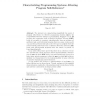Free Online Productivity Tools
i2Speak
i2Symbol
i2OCR
iTex2Img
iWeb2Print
iWeb2Shot
i2Type
iPdf2Split
iPdf2Merge
i2Bopomofo
i2Arabic
i2Style
i2Image
i2PDF
iLatex2Rtf
Sci2ools
CIE
2007
Springer
2007
Springer
Characterizing Programming Systems Allowing Program Self-reference
The interest is in characterizing insightfully the power of program self-reference in effective programming systems (epses), the computability-theoretic analogs of programming languages. In an eps in which the constructive form of Kleene’s Recursion Theorem (KRT) holds, it is possible to construct, algorithmically, from an arbitrary algorithmic task, a self-referential program that, in a sense, creates a selfcopy and then performs that task on the self-copy. In an eps in which the not-necessarily-constructive form of Kleene’s Recursion Theorem (krt) holds, such self-referential programs exist, but cannot, in general, be found algorithmically. In an earlier effort, Royer proved that there is no collection of recursive denotational control structures whose implementability characterizes the epses in which KRT holds. One main result herein, proven by a finite injury priority argument, is that the epses in which krt holds are, similarly, not characterized by the implementability of ...
CIE 2007 | Denotational Control Structures | Kleene’s Recursion Theorem | Recursive Denotational Control |
Related Content
| Added | 07 Jun 2010 |
| Updated | 07 Jun 2010 |
| Type | Conference |
| Year | 2007 |
| Where | CIE |
| Authors | John Case, Samuel E. Moelius |
Comments (0)

